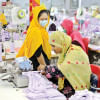RMG export prices fall up to 16% in last 8 months

Export prices of locally made garment items have fallen by 8 percent to 16 percent year-on-year over the last eight months, according to data of the Bangladesh Garment Manufacturers and Exporters Association (BGMEA).
International market prices declined mainly because of a fall in demand from end consumers suffering from high inflationary pressure due to the severe fallouts of Covid-19 and Russia-Ukraine war.
Moreover, the volume of garments exported from Bangladesh to major markets also exhibited a declining trend over the past 10 months.
For instance, the import of apparel from around the world by the US declined by 7 percent and by European Union (EU) by 13 percent in the July-April period of the current fiscal year.
This was due to the fall in demand, the BGMEA said.
Although there was 4.97 percent growth in Bangladesh's garment exports during this period, it was far lower than the 9.09 percent rise recorded in the corresponding period of fiscal year 2022-23.
However, the bank interest rate rose by 15 percent and cost of production by 50 percent over the last five years, said BGMEA President SM Mannan Kochi yesterday.
The cost of production has increased because of a hike in gas and power prices and wages of workers, he told a views-exchange meeting with journalists at Pan Pacific Sonargaon Dhaka.
Kochi also said a recent government decision to not allow any investment to be made outside of export processing zones and special economic zones would have a negative effect on the inflow of such funds into the country.
He urged the government to review the decision to enable investors to set up factories outside of the zones.
The BGMEA president also urged the government to prepare major special economic zones with adequate supplies of gas, power and logistics services so that those could become operational soon.
He also suggested that the government bring an end to harassment at the National Board of Revenue's offices, such as those dealing with customs, bond and VAT.
Kochi demanded that the government reduce source tax to 0.5 percent from existing 1 percent in the next budget to make businesses more competitive.
Moreover, the government should continue to provide cash incentives at previous rates until 2029, he said.
This is due to the fact that the World Trade Organization also agreed to continue trade benefits up to 2029 for least developed countries, including Bangladesh, graduating to developing nation status, he said.
The government should ensure rations of essential food commodities for garment workers and facilitate entrepreneurs investing in non-cotton and manmade fibres for the country to grab a bigger share of the world trade of value-added garments, he said.
Achieving the $100 billion garment export target by 2030 is possible if the government ensures gas and power supplies and provides policy support, he added.
Bangladesh exported garment items worth $40.49 billion in the July-April period of the current fiscal year, according to data of the Export Promotion Bureau.
In the same 10 months of fiscal year 2022-23, export earnings from the sector stood at $46.99 billion.
The BGMEA has been trying to increase exports to new destinations like Turkey, Brazil, Argentina, Russia, South Africa and member countries of the Association of Southeast Asian Nations, he said.
Kochi also said the new BGMEA board has also been trying to simplify the trade procedures by resolving problems related to customs, VAT and RMG Sustainability Council.

 For all latest news, follow The Daily Star's Google News channel.
For all latest news, follow The Daily Star's Google News channel. 








Comments